(Feb. 29, 2016: Please note that my views regarding The Butler have changed significantly. Please see my dissertation when it is published for my revised analysis.)
The Butler follows the life of the fictional Cecil Gaines, his wife, and kids from the time he is a child working as a sharecropper until directly after the election of Barack Obama to the office of President of the United States. While the writer and director do exceptionally well showing some of the true violence and pressure African Americans faced leading up to, during, and after the Modern Civil Rights Movement, The Butler primarily focuses on two basic themes and two important, yet very different, strategies used to gain civil rights.While not without significant problems, this film will certainly go down in cinema history as a groundbreaking film. Continue reading for my detailed thoughts. If you haven’t seen it, look at the trailer here, if you wish.
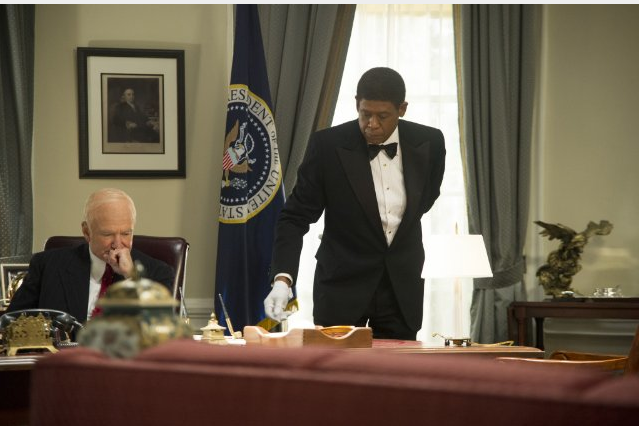
The Butler advertises and presents itself as being based on a true story (read: that events in The Butler really happened). Moreover, any story that deals with actual events, places, people, and presidents, will be perceived as having actually happened. The film features Dr. Martin Luther King, Jr. and all of the presidents at least briefly from Eisenhower to Reagan. The Butler also features many (but certainly not all-the moon landing is not discussed) of the major events of the 50s, 60s, and 80s.
Nevertheless, beyond these “great men” and national events, The Butler is mostly fiction. It is very, very, very, very loosely based on the life of Eugene Allen, who worked in the White House for 34 years. Although in many ways it does not matter what elements are fact or fiction because a movie that portrays 90 years in slightly over 2 hours is naturally going to be supremely selective in what is and isn’t covered. We have to carefully question why we are shown what we are. Because this is a review of the film and I am most interested in representations, my comments about the exact historical accuracy per se will be brief when mentioned other than to generally say that all of the changes from the true story make the decades portrayed in the film seem more open, more accessible, and more equal than was actually possible. For example, in the film “the butler” is called by the White House, when in reality he called them. Likewise, in reality, “the butler” had one son. In the film, he had two. One died in Vietnam, and the other was a vocal, active civil rights protestor. In the film, the presidents know about this activist son and talk with Cecil about him. In reality, had “the butler” had such a son, he would certainly have been fired.
The Butler does far more than virtually all other films at showing aspects of the true hatred that was directed toward black Americans throughout the 20th century; although, it is not without problems. Of course not all so-called white people were racist, but the dominant culture and law were extremely racist. The film’s second scene shows two lynched black men. In the next scene, Cecil’s mother is raped and his dad shot in the head by the white man who owns the land when Cecil is just a young child. Before being murdered, Cecil’s dad, speaking of the white man, says, “This is his world. We’re just living in it.” A few scenes later, we see two more lynched black men. White men really were able to do basically anything and everything to black men and women without punishment. Specifically, between 1880 and 1940, at least 3,409 black Americans were lynched. While it is “good,” historically speaking, that the film acknowledges lynchings in the way, it is almost too much, yet also not enough. They are never discussed – just shown. And the bodies aren’t disfigured or presented the way lynchings actually occurred, as documented by much photographic evidence. In some ways, the representations of lynching in The Butler were more akin to being in a scary funhouse for a minute compared to actually being there.
Years later in the story line, Cecil’s wife talks about Emmett Till and gives a fairly accurate description of his murder as it actually happened. Several scenes later, the camera briefly shows an actual newspaper cover of Till’s disfigured body. We see a few pictures of protestors at Little Rock High School, too.
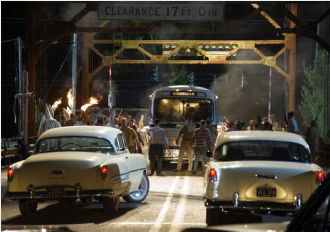 The next time The Butler shows violence is in the late 1950s and early 60s when Cecil’s son participates in the Freedom Rides and Sit-in Movement. Here, too, the movie does a notable job at showing what life was really like for black (and white) Americans demanding equality. The Freedom Bus is stopped by the Klu Klux Klan and their burning crosses. The KKK proceeds to set the bus on fire while attempting to hurt/kill the passengers.
The next time The Butler shows violence is in the late 1950s and early 60s when Cecil’s son participates in the Freedom Rides and Sit-in Movement. Here, too, the movie does a notable job at showing what life was really like for black (and white) Americans demanding equality. The Freedom Bus is stopped by the Klu Klux Klan and their burning crosses. The KKK proceeds to set the bus on fire while attempting to hurt/kill the passengers.
At the Sit-ins, counter-protestors spit on, push, hit, step on, poor ketchup and pepper on, and do countless other things to the white and black participants. The film also does a good job of showing one of the ironies of segregation. Black men and women were not allowed to sit freely in restaurants, but they could and did work behind the counter. They could serve food, but could not eat it. They could be on one side of the counter but not the other. On the other hand, in the background of this scene, a sign says “colored seating area.” The camera clearly points to a few women sitting at the end of the counter. From everything I have read and seen, this is ahistorical. Some restaurants had a “standing only area” for blacks, while others would serve non-whites at the back door only.
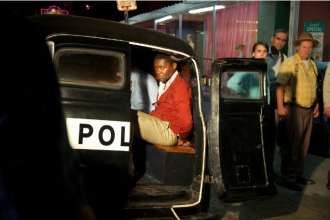 We also see accurate and important representations of the tensions that divided families and even individuals during the height of the Modern Civil Rights Movement. The older generation generally maintained a work hard, survive, and wait attitude, while the younger generation had a fight hard and demand equality now approach. In the film, the tension between Cecil and his son (who has been arrested 16 times in about two years) was so strong they frequently fought and ultimately did not speak for decades. Cecil says his son is part of the problem. Throughout Cecil’s life he is told that he has to manage two faces: one for family and friends, and another for whites while serving them. This tension and generational difference is magnified as the film cuts back and forth from the son’s protests to the dad’s work in the White House. Although the films representation of Dr. Martin Luther King, Jr. has King saying “black domestics defy stereotypes.” From what I can find and what I know, King never said this or anything like it. Was this quote really just made up? Regardless, why have one of King’s only lines be something that actually does speak to stereotypes rather than progress and equality and his dreams? The Butler also makes another shift as relates to King compared to other films: Most films treat him in a more “god-like” way – they don’t directly show his face and he is given distinct and brief attention.
We also see accurate and important representations of the tensions that divided families and even individuals during the height of the Modern Civil Rights Movement. The older generation generally maintained a work hard, survive, and wait attitude, while the younger generation had a fight hard and demand equality now approach. In the film, the tension between Cecil and his son (who has been arrested 16 times in about two years) was so strong they frequently fought and ultimately did not speak for decades. Cecil says his son is part of the problem. Throughout Cecil’s life he is told that he has to manage two faces: one for family and friends, and another for whites while serving them. This tension and generational difference is magnified as the film cuts back and forth from the son’s protests to the dad’s work in the White House. Although the films representation of Dr. Martin Luther King, Jr. has King saying “black domestics defy stereotypes.” From what I can find and what I know, King never said this or anything like it. Was this quote really just made up? Regardless, why have one of King’s only lines be something that actually does speak to stereotypes rather than progress and equality and his dreams? The Butler also makes another shift as relates to King compared to other films: Most films treat him in a more “god-like” way – they don’t directly show his face and he is given distinct and brief attention.
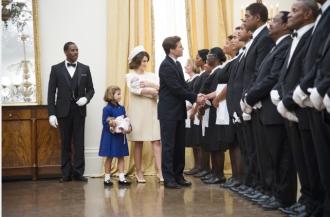 In The Butler, the White House is almost exclusively a safe, enlightened, and progressive place – literally a “white” house (the White House actually first received its official name—White House—in the early 1900s to symbolize that black people were not allowed as guests or to live there, ever, as they saw it). The government as a whole at the national level is a progressive entity and ready to embrace equality. Furthermore, scenes with presidents are pretty much just made up. Cecil’s job is to serve while being invisible. There are many scenes of him with various presidents. In some of these, Cecil is in the room when important top-sescret information is being discussed. In other scenes, the presidents specifically asks him a question. Eisenhower, thinking about the Brown v Board case, asks him, “Cecil did you attend an all colored school?” He responds that he didn’t attend school and grew up on a cotton farm. Such a question and conversation suggests a possibility that would have been impossible for most men of Cecil’s age and background. In another scene, the directors fictional/filmic JFK says, “I never really understood what you all went through…you’ve changed my heart.” The historical JFK only responded to civil rights demands after much pressure. This conversation also seems to have been made up. Beyond being denied a raise twice by the man who originally hired him, Cecil is never mistreated at the White House. We never see any of his everyday struggles. The Butler also has a strange fascination with George Washington: At least 10 times he is shown in the background—2 different portraits and 1 bust are used.
In The Butler, the White House is almost exclusively a safe, enlightened, and progressive place – literally a “white” house (the White House actually first received its official name—White House—in the early 1900s to symbolize that black people were not allowed as guests or to live there, ever, as they saw it). The government as a whole at the national level is a progressive entity and ready to embrace equality. Furthermore, scenes with presidents are pretty much just made up. Cecil’s job is to serve while being invisible. There are many scenes of him with various presidents. In some of these, Cecil is in the room when important top-sescret information is being discussed. In other scenes, the presidents specifically asks him a question. Eisenhower, thinking about the Brown v Board case, asks him, “Cecil did you attend an all colored school?” He responds that he didn’t attend school and grew up on a cotton farm. Such a question and conversation suggests a possibility that would have been impossible for most men of Cecil’s age and background. In another scene, the directors fictional/filmic JFK says, “I never really understood what you all went through…you’ve changed my heart.” The historical JFK only responded to civil rights demands after much pressure. This conversation also seems to have been made up. Beyond being denied a raise twice by the man who originally hired him, Cecil is never mistreated at the White House. We never see any of his everyday struggles. The Butler also has a strange fascination with George Washington: At least 10 times he is shown in the background—2 different portraits and 1 bust are used.
The “real” butler, Eugene Allen, spent years working his way up to be a butler and seldom interacted with presidents. (The film suggests he interacted with the president all the time.) Additionally, Allen worked six days a week and long hours each day – the long hours were occasionally implied in the film but were not emphasized or specifically discussed—at all.
A few additional lingering and bothersome points about The Butler deserve mention. Why do basically all of the characters smoke? Like smoking in any film, it risks sending the wrong message to younger audiences and certainly ignores health risk involved. Especially, why in the world does Oprah smoke in the film?! As a famous, respected, and very successful woman, she ultimately condones smoking. According to different interviews with Lee Daniels, the director, Oprah started smoking for this role. He said he had to teach her how to smoke and they were careful so she wouldn’t get addicted. If smoking had been omitted, the substance of the film’s history would be altered very, very, very little.
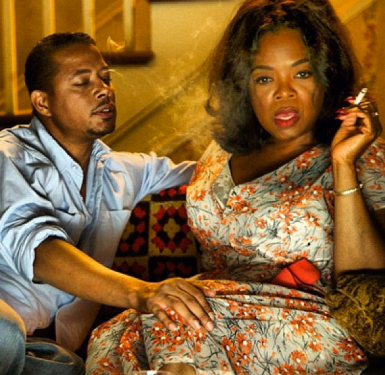 Likewise, the acting is lacking in places. Oprah is so immediately recognizable as “Oprah” that it takes away from the quality of the film. They should have given her a different look and/or a different accent – perhaps even picked someone else or a professionally trained actress or an actress with more experience. In addition, the counter protests during the KKK and Sit-in scenes feel entirely too much like reenactments. The film still gets credit for showing this violent side of the United States’s history, but they could have used much more rehearsal and actors and actresses who could really become racist for their roles – although I know “becoming” such a character must be a profoundly difficult task. Some of this could probably have been improved if the scenes were more rehearsed. In one interview, the director said nothing was rehearsed because they didn’t have enough time or money. (In the scene where Oprah’s character has died you can very clearly see that she is still fully breathing!)
Likewise, the acting is lacking in places. Oprah is so immediately recognizable as “Oprah” that it takes away from the quality of the film. They should have given her a different look and/or a different accent – perhaps even picked someone else or a professionally trained actress or an actress with more experience. In addition, the counter protests during the KKK and Sit-in scenes feel entirely too much like reenactments. The film still gets credit for showing this violent side of the United States’s history, but they could have used much more rehearsal and actors and actresses who could really become racist for their roles – although I know “becoming” such a character must be a profoundly difficult task. Some of this could probably have been improved if the scenes were more rehearsed. In one interview, the director said nothing was rehearsed because they didn’t have enough time or money. (In the scene where Oprah’s character has died you can very clearly see that she is still fully breathing!)
At least for some, the film will be heavily tarnished since the film ends being a political advertisement for Barack Obama. This even bothered me (someone who voted and campaigned for Obama both times) because it went from being pro-civil rights and pro-equality to implying this also meant supporting Obama, regardless.
In addition to the above, The Butler would have been more powerful if we the audience had feelings for Cecil. I can’t exactly figure out why but I didn’t emphasize with Cecil or the other characters that much. The film was too distantiating. It covered too many things. It also has too much telling what happened and not enough showing what happened.
Finally, the film cover is very misleading to what the film is specifically about.
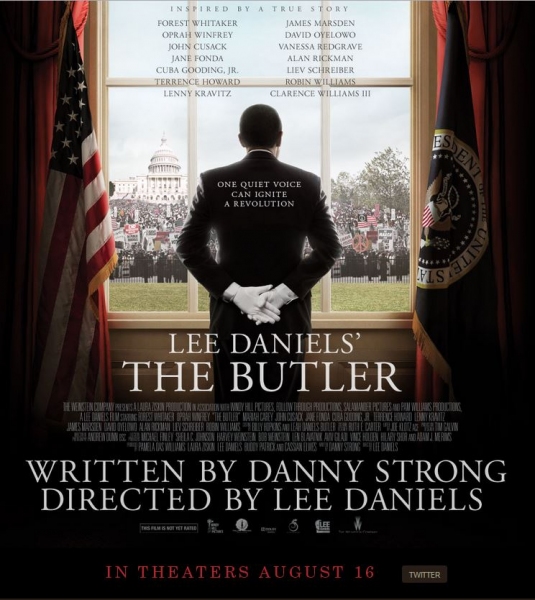
The Butler’s best accomplishment is having a predominantly African American cast and a narrative that, for the most part, truly does center around individuals racialized as black. Furthermore, it shows how truly scary and unpredictable life could be for black Americans. Far too many films only marginalize or ignore the black voice and privilege and sanction the white voice. In other words, it would absolutely pass my version of a Bechdel Test for race. Such a test looks for a film: 1) with two or more non-white characters with names, 2) who talk to each other, 3) about something besides white people.
What did you think about The Butler? I’ve seen it twice, and I still haven’t reached a final overall evaluation. I’m also saying several of my ideas for my dissertation, as this film will be part of a chapter.
As always, thanks for reading and commenting.